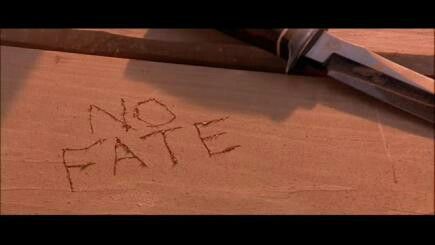γενήσομαι «ge-ney-soh-mey : i am becoming»
These are the chronicles of the esoteric . . .
Hi. My name is Eric Jordan and I'm an open theist.
Many of you won't even know what I'm talking about. But for many others this admission is fairly heretical—or at the very least troublesome.

Image still from 'The Terminator.'
I want to put it out there though because I think open theism is the beginning step to making sense of biblical theology—open theism, in my mind, is a theological perspective that aligns the realities we experience in the world with the biblical narrative in a way that is intelligible. It takes what the Bible shows us about God's character and positions it alongside what we see in human history.
It reconciles God's actions with the reality of his creatures' agency. Open theism not only tells us God's role in the world but also ours.
So what exactly is open theism?
The Open Future
Open theism as a theological interpretation argues that—to put it simply and perhaps crudely—the future is unknown. This is its biggest and most controversial tenet—the trunk from which all branches flow, the base upon which the framework is secured.
As an open theist, therefore, I hold to what theologians call an 'open future.' This principle is as straightforward as you think: it argues that the future is open as opposed to closed—the future is unwritten as opposed to predetermined. The future is merely a set of possibilities and not a laid out path.
As Sarah Connor says in the movie The Terminator, 'The future is not set.'
In contrast, classical theism presents the future as a set of facts that God is privy to—God's foreknowledge is such that God knows what will happen before it happens. For classic theism, the future is known by God as already happened—the future is a set of events which God knows will happen in a certain way.
Here's where classic theism can get a little nuanced in its attempt to make sense with itself. Some classic theists will argue that simply because God knows an event will go a certain way doesn't mean God predetermines it to. However, this argument only gets us stuck inside a logical loop—God knows a particular thing will happen a particular way so it must happen that way, which means the event's particular happening was already written because it could not have happened any other way. So whether God wants history to go a certain way or not, it will go the way God knows it will go because God knows that it will go that way.
I mean, this leaves us not only with a headache but it also leaves us all as passive pawns in the narrative of the cosmos—even God in this thinking simply sits back and 'knows' it to play out. We have no part to play, no agency.
Open theism however very much affirms our agency.
Free Will
If God has truly bestowed upon us free will then our ability to make decisions must make a difference or we are nothing more than automatons—zombies blindly following the path ahead of us, a path God foreknows we will take and thereby a path that is in some ways determined for us.
If however we are beings who can truly make our own decisions and truly follow our own paths, then the future by definition cannot be known—at least not in the way we might think.
Indeed, precisely because of our agency God cannot know the future as facts—the future can only exist as a bundle of possibilities, not a linear set of certainties. If we are all capable of genuine choice then the future ahead of us cannot exist in any real shape or form—instead, the future can only be a vast collection of various branches of possibilities shooting out from any given moment.1
This is after all how we experience our individual lives—open theism argues that this is how God experiences the world too.
The traditional view of classic theism is at its core not one of a personal God—instead, classical theism is in many ways veiled Deism.2 The God we are traditionally taught, who predetermines all events of history, is nothing more than a distant deity who winds up the clock and sits back as it goes around—but classic theism seeks to have the façade of a God who is somehow emotionally invested in its zombie subjects (who are merely blindly following the path laid before them).
That is neither a deity I care for, nor is it the God presented to us in the Bible.
God in Relation
No, the God in the Bible is a God who enters into relationship with humanity and is affected by that relationship—God reacts and changes as a result of what we do.
To consider God changing makes a lot of people uncomfortable. God, we are taught, is unchangeable. Philosophically we call this immutable and impassable—that God is ever the same and is also unaffected by external factors. Biblically we know this to be untrue.
In fact, these attributes came about from Greek philosophers who came to the conclusion that if the gods are perfect and we are not, then the gods must be unchanging since we change—imperfection for them meant changing and perfection doesn't require anything 'added' to it, and therefore remains unchanged. For these philosophers, the gods knew of changing history from an unchanging and distant standpoint, and therefore they concluded that the gods must know all of time—past, present, and future—completely and exhaustively all at once, in a definite way.
But if possibilities are to be real—if we are genuinely able to make choices and steer history—then God must experience time as we do, and know the future as possibilities as we do. For God, as with us, the future is indefinite.
An important principle in open theism is that God is influenced and affected by creation and the creatures therein. That is, God is emotionally impacted by what occurs in the world—God is actually and fully emotionally and personally invested in us and the entire cosmos.3 What we do makes a difference.
In Terminator 2, Sarah Connor states that there is 'no fate but what we make.' Indeed, as free agents—beings with free will—open theism argues that God has created us to establish through our actions the course of history. We are made genuine partners who with God co-determine the cosmic narrative.
For open theism, God's will for the future is brought about by participation and cooperation with us.4
The Human Role
We therefore have a part to play in the grand scheme of things—we are not 'off the hook' for anything. Indeed, in my opinion, open theism produces the most sensible theology of our human responsibilities—it precisely defines our charge, our culpability, and our function. Open theism outlines the jurisdiction given to us and the real responsibility we have.
Indeed, if we are free agents whose decisions actually make a difference in history's trajectory and outcome then we each have a very real duty to be stewards of humanity and to the earth—we have a real responsibility to do our part to ensure that everyone and everything is treated justly and can flourish.
Since we co-determine history with God then we cannot idly sit by and expect history to resolve itself. We must act. It is our God-given privilege.
The problem with this of course is that if we are free agents there is a very distinct and very real possibility we will not do what God wants—and so there exists the element of risk in open theism. If God allows us to co-write history, this isn't always for the better but that is the risk God has chosen to take.
There are many questions and objections that arise, but the purpose of this post is simply to provide an overview. I do plan on following a few of the threads in coming posts (I did begin looking at suffering some time ago, and I'm working on at least a second part for the future), but for now I hope this has given you an idea upon what much of my theology is founded. ✤
1. Many open theists will concede however that in God's infinite knowledge God is able to predict any number of possibilities and can therefore plan for any and every eventuality—but God is in the end only reacting to what in reality occurs since the actual path taken can only be known when that path is actually taken.
2. Deism is a philosophical belief that can be traced back to the 16th and 17th centuries. Deism doesn't deny the existence of a deity, but it asserts that the supreme being is completely unknowable—piety and morality could be known rationally and therefore any special revelation was rejected by deists. Deism believed that the supreme being—or the 'first cause'—did not intervene in nature but instead created the universe to behave under certain universal and natural laws and thus the cosmic narrative would simply move forward without any input. It is from Deism we get the analogy of the 'clockmaker god.'
3. R T Mullins & Emanuela Sani, 'Open Theism and Risk Management: A Philosophical and Biological Perspective,' Wiley Online Library (https://onlinelibrary.wiley.com/...).
4. Roger E Olsen, 'A Relational View of God's Sovereignty,' My Evangelical Arminian Theological Musings (https://www.patheos.com/blogs/rogereolsen...).
 Subscribe!
Subscribe! Main
Main Comments (0)
Comments (0)




